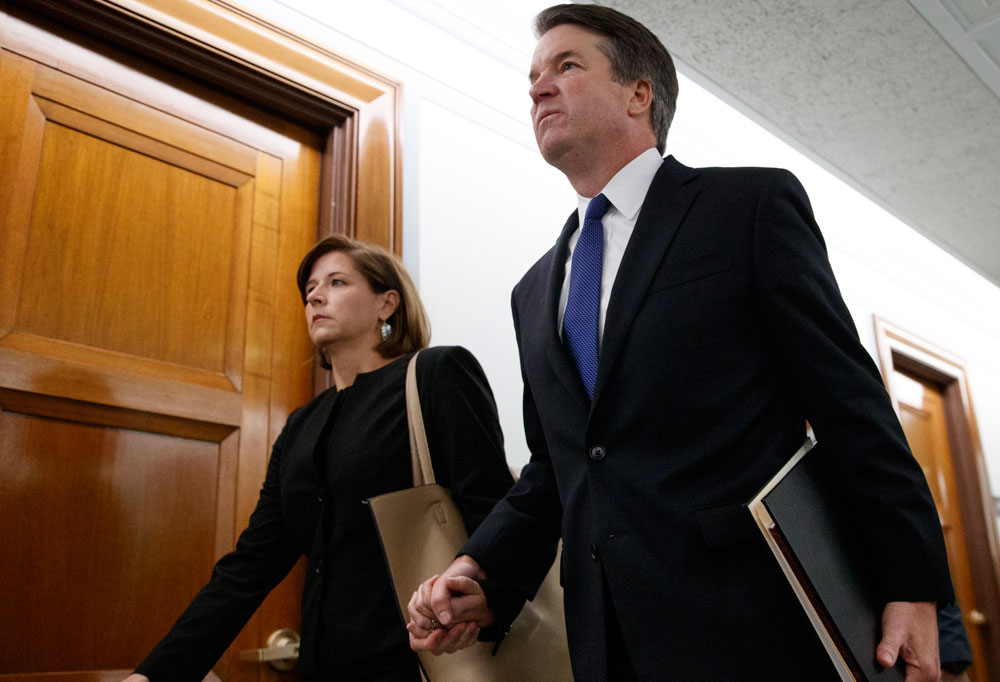Brett Kavanaugh's angry denunciation of Senate Democrats at his confirmation hearing could reinforce views of the Supreme Court as a political institution at a time of stark partisan division and when the court already is sharply split between liberals and conservatives.
The Supreme Court nominee called the sexual misconduct allegations against him a 'calculated and orchestrated political hit' by Democrats angry that Hillary Clinton lost the 2016 election. Kavanaugh went further than Clarence Thomas, who in 1991 attacked the confirmation process but didn't single out a person or political party, when he confronted allegations that he sexually harassed Anita Hill.
The comments injected a new level of bitter partisanship in an already pitched battle over the future of the Supreme Court and replacing Justice Anthony Kennedy, frequently the decisive and swing vote on the most important issues of the day. Kavanaugh is more conservative than Kennedy and his ascendance to the high court would entrench conservative control of the bench for years.
'No matter what happens ... I think the court is the ultimate loser here. I think Judge Kavanaugh could have made the exact same points without making reference to the Clintons or Democrats, without going down that road,' said Josh Blackman, a law professor at the South Texas College of Law in Houston. 'It's an optics thing. I don't think he'll vote any differently because of what happened in the past 10 days, but what will change is how people perceive it.'
In his pointed remarks, Kavanaugh said he was a victim of character assassination orchestrated by Democrats. 'This whole two-week effort has been a calculated and orchestrated political hit, fueled with apparent pent-up anger about President Trump and the 2016 election, fear that has been unfairly stoked about my judicial record, revenge on behalf of the Clintons and millions of dollars in money from outside left-wing opposition groups,' he said.
Vanderbilt University law professor Suzanna Sherry said that even if Kavanaugh was 'spurred by the provocation he felt, the fact that he spoke out that way suggests he may be biased against Democrats when he gets on the court.'
Still, said University of Chicago law professor Eric Posner, a winning argument would have to attract at least five votes so that 'if four other justices agree with him, the force of that will be diminished.'
There is a sharp contrast between what Kavanaugh said Thursday in a bid to save his nomination and the efforts of the justices to underscore the differences between them and the political branches of government.
Justice Elena Kagan talked about perceptions of the court in an appearance at UCLA on Thursday. 'The court's strength as an institution of American governance depends on people ... believing that it is not simply an extension of politics, that its decision-making has a kind of integrity to it,' Kagan said. 'And if people don't believe that they have no reason to accept what the court does.'
The court's legitimacy was on the mind of Chief Justice John Roberts during an argument last year in a case about the drawing of electoral maps for partisan advantage. Putting the court in the middle of 'deciding whether Democrats or Republicans would win in each case' would 'cause very serious harm to the status and integrity of the decisions of this court in the eyes of the country,' Roberts said.
When the justices have said or done something seen as political, the reaction is often swift. In 2016, for example, Justice Ruth Bader Ginsburg apologized for remarks in which she had called then candidate Donald Trump a 'faker,' among other things. And Justice Neil Gorsuch was criticized by some on the left for speaking to a conservative group at an event at the Trump hotel in Washington, months after he took the bench.
The Supreme Court has never been as non-political as the justices would like Americans to believe. A century ago, Justice Charles Evans Hughes resigned from the court after he had been chosen as the Republican presidential nominee in 1916.
At the same time, in the post-World War II era, some justices put on the court by Republicans have been among the more liberal justices, while some choices of Democratic presidents often voted with conservatives.
But the push for ideological purity from both parties in pursuit of justices who will vote the 'right' way for decades has almost perfectly aligned party and ideology. The court's most liberal members are all Democratic appointees and the conservatives, Republican.
Until Thursday, though, the rest of the world could discuss how Republicans want to appoint conservative judges and Democrats want to appoint liberal judges, but the nominees themselves would insist they are impartial, Posner said.
Kavanaugh may well have been justified in his comments, he said, but by attacking the other side in partisan terms, 'you begin to sound like a partisan yourself.'











